
Home
Services
About us
Blog
Contacts
Custom IoT App Development Service: Comprehensive Guide for Businesses
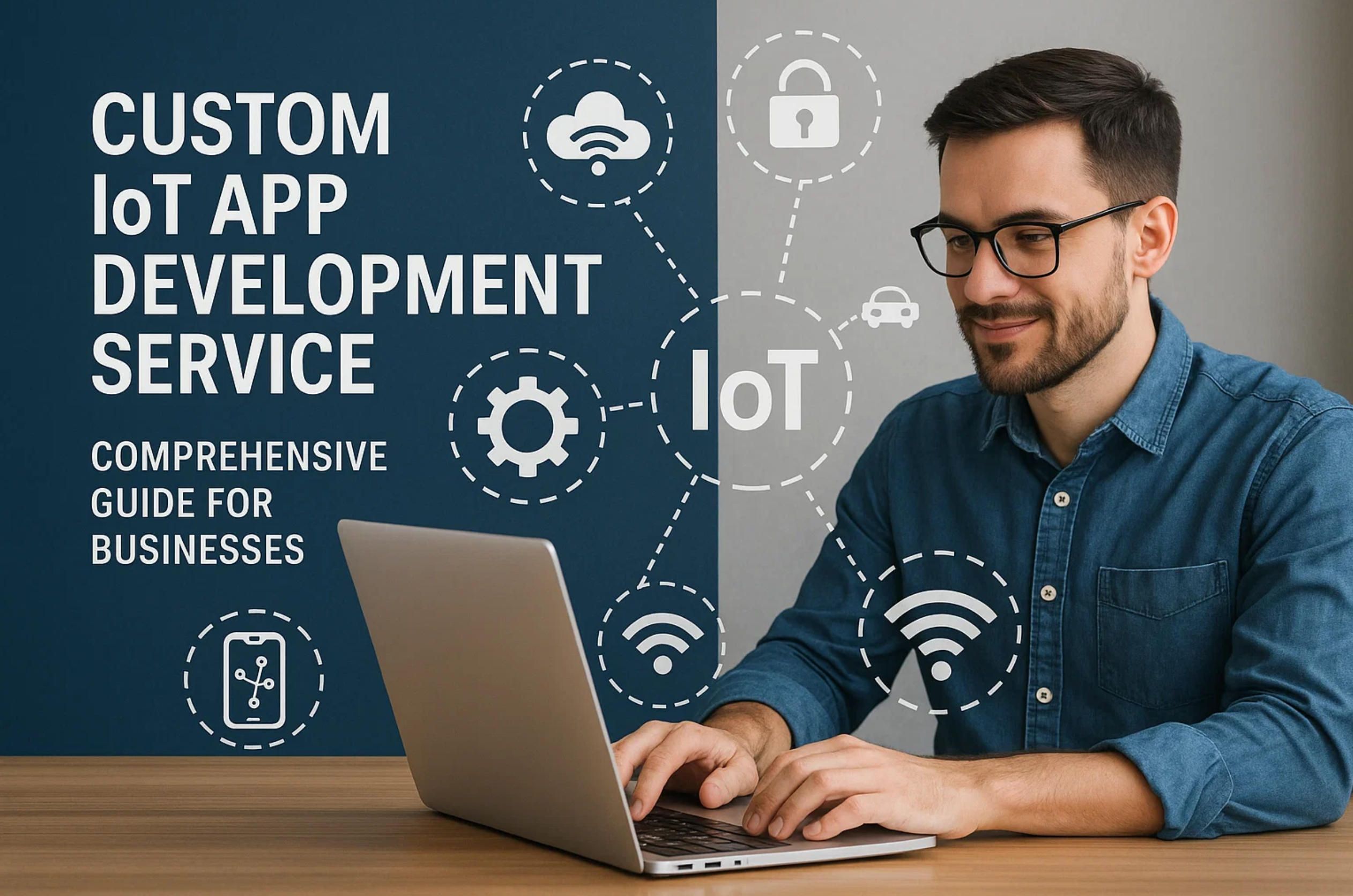
The connected device ecosystem continues expanding at a measurable pace. According to IoT Analytics, the number of connected IoT devices reached 16.6 billion by the end of 2023, marking a 15% increase from the previous year, with projections indicating growth to 40 billion devices by 2030. This expansion creates substantial opportunities for businesses seeking to leverage connected technology for operational improvements and customer engagement.
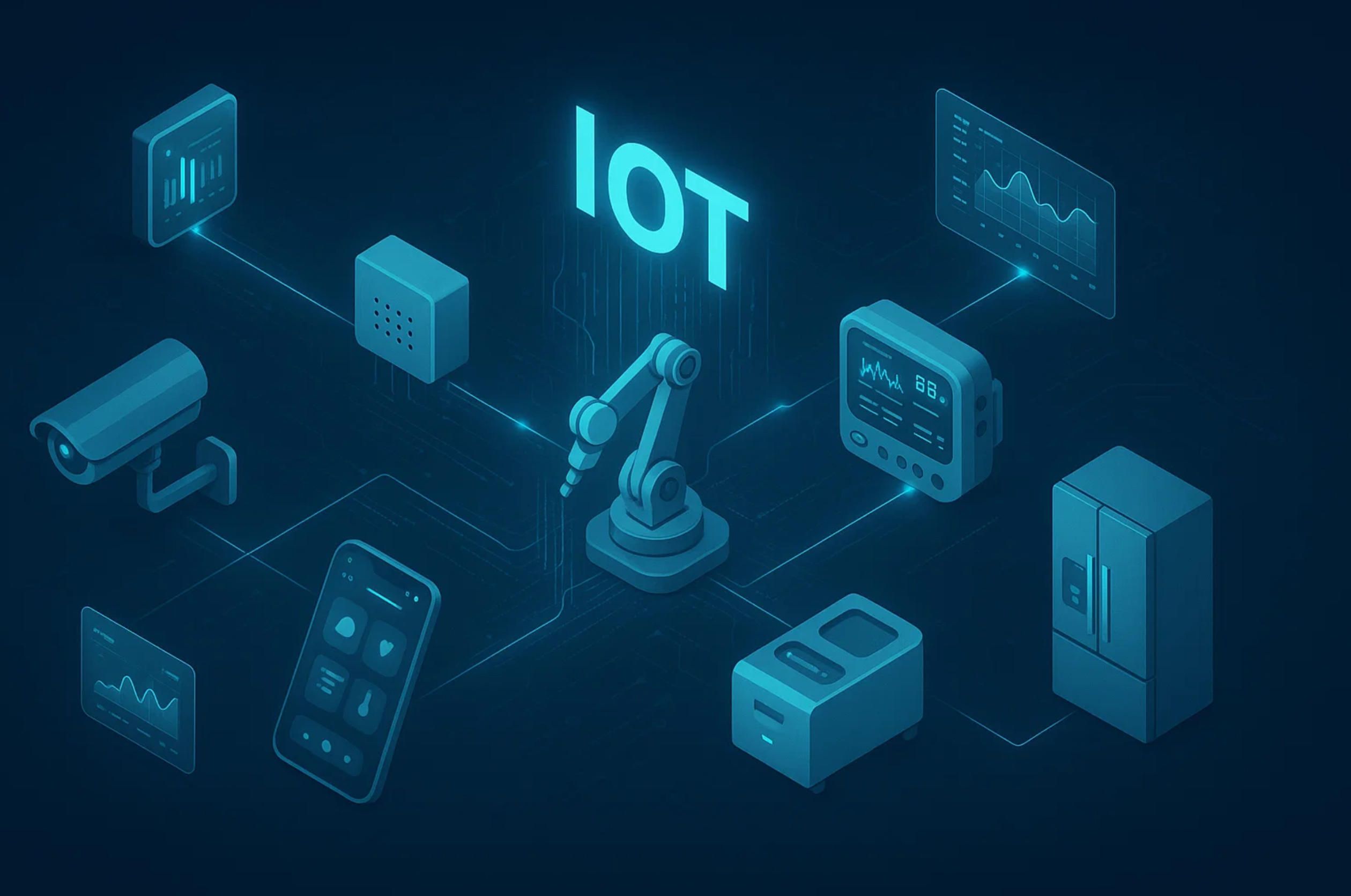
Understanding Custom IoT Application Development
A custom iot app development service addresses specific business requirements that off-the-shelf solutions cannot fulfill. Unlike generic platforms, custom development allows organizations to build applications tailored to their unique hardware configurations, data processing needs, and user workflows. This approach proves particularly valuable when integrating with existing infrastructure or implementing specialized functionality across distributed device networks.
Every custom iot app development service begins with four fundamental components: cloud technology for data processing and storage, dedicated hardware equipped with sensors, reliable network connectivity, and intuitive software interfaces. The challenge lies in orchestrating these elements to create a cohesive system that delivers measurable business value.
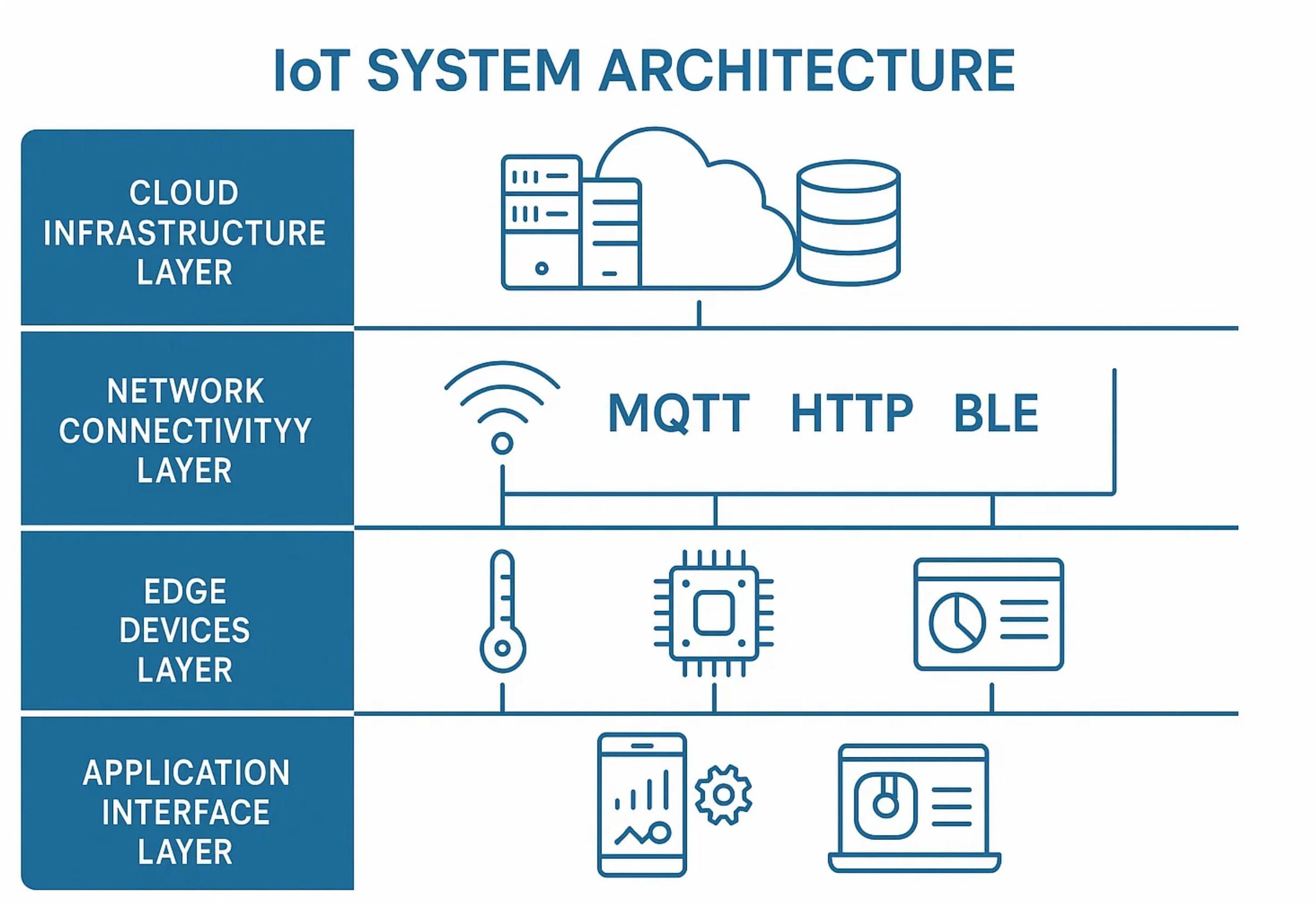
Core Technical Requirements
Businesses evaluating a custom iot app development service typically prioritize several technical capabilities. Security stands at the forefront, as connected devices create multiple entry points for potential breaches. Development teams must implement secure boot processes, hardware-based authentication, and encrypted data transmission protocols from the project's inception.
Scalability represents another critical consideration. IoT systems generate substantial data volumes that grow as device deployments expand. A well-designed custom iot app development service accounts for this growth through modular architecture and efficient data processing pipelines. The system must handle increasing loads without performance degradation or costly infrastructure overhauls.
Integration capabilities determine how effectively new IoT solutions work alongside existing business systems. Organizations often maintain legacy infrastructure that needs to communicate with modern connected devices. Development teams must navigate various protocols, data formats, and communication standards to ensure seamless interoperability.
Business Drivers and Market Context
The IoT Application Development Services Market demonstrates consistent growth trajectories. Industry analysis from Credence Research indicates the market reached $21.9 billion in 2024 and anticipates growth to $66.1 billion by 2032, representing a compound annual growth rate of 14.8%. This expansion reflects increasing recognition of IoT's potential to improve operational efficiency and reduce costs.
Manufacturing leads adoption rates, with more than 35% of manufacturers implementing IoT solutions for predictive maintenance, quality control, and supply chain optimization. Healthcare follows closely, as 30% of providers utilize connected devices for remote patient monitoring and real-time health data analytics. These sectors demonstrate the practical applications driving demand for custom iot app development service offerings.
Organizations invest in custom solutions primarily to achieve cost efficiency, process automation, and better resource utilization. The ability to collect and analyze real-time data from connected devices enables informed decision-making and proactive problem resolution. These benefits translate directly to competitive advantages in rapidly evolving markets.
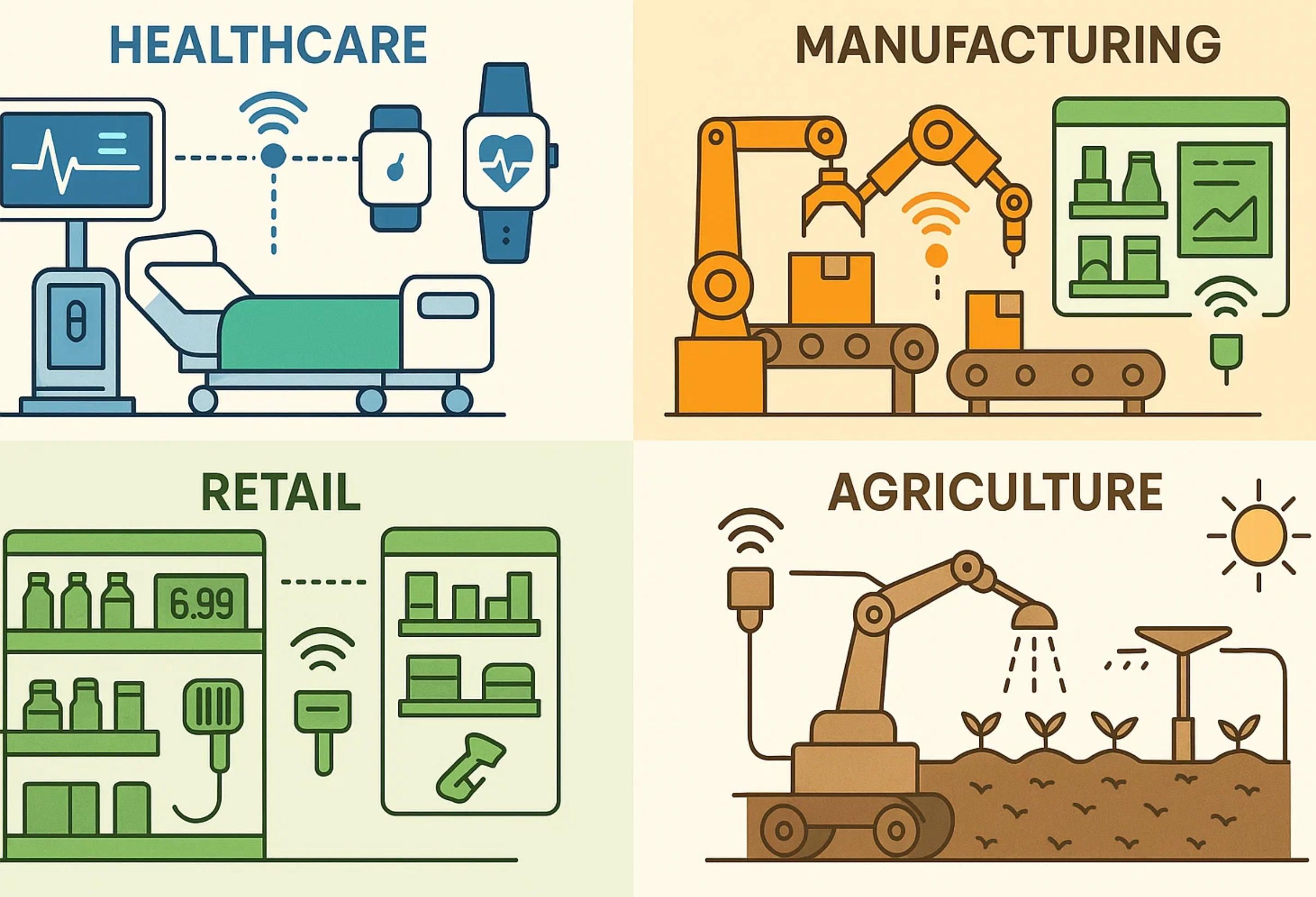
Industry-Specific Applications
Different sectors approach custom iot app development service with distinct requirements and constraints. Healthcare applications must comply with strict regulatory standards while ensuring patient data privacy. Medical device manufacturers need FDA-compliant solutions that integrate with existing hospital information systems and electronic health records.
Retail environments deploy IoT solutions for inventory management, customer behavior analysis, and personalized shopping experiences. Smart shelves equipped with weight sensors automatically track product quantities and trigger restock alerts. Connected point-of-sale systems collect transaction data that feeds into analytics platforms for demand forecasting and pricing optimization.
Manufacturing facilities implement Industrial IoT (IIoT) solutions to monitor equipment performance, predict maintenance needs, and optimize production schedules. Sensors embedded in machinery collect temperature, vibration, and operational data that machine learning algorithms analyze to identify patterns indicating potential failures before they occur.
Agriculture leverages connected sensors for precision farming, monitoring soil moisture, temperature, and nutrient levels. Automated irrigation systems adjust water delivery based on real-time conditions, reducing waste while improving crop yields. GPS-enabled equipment tracking helps farm managers optimize resource allocation across large properties.
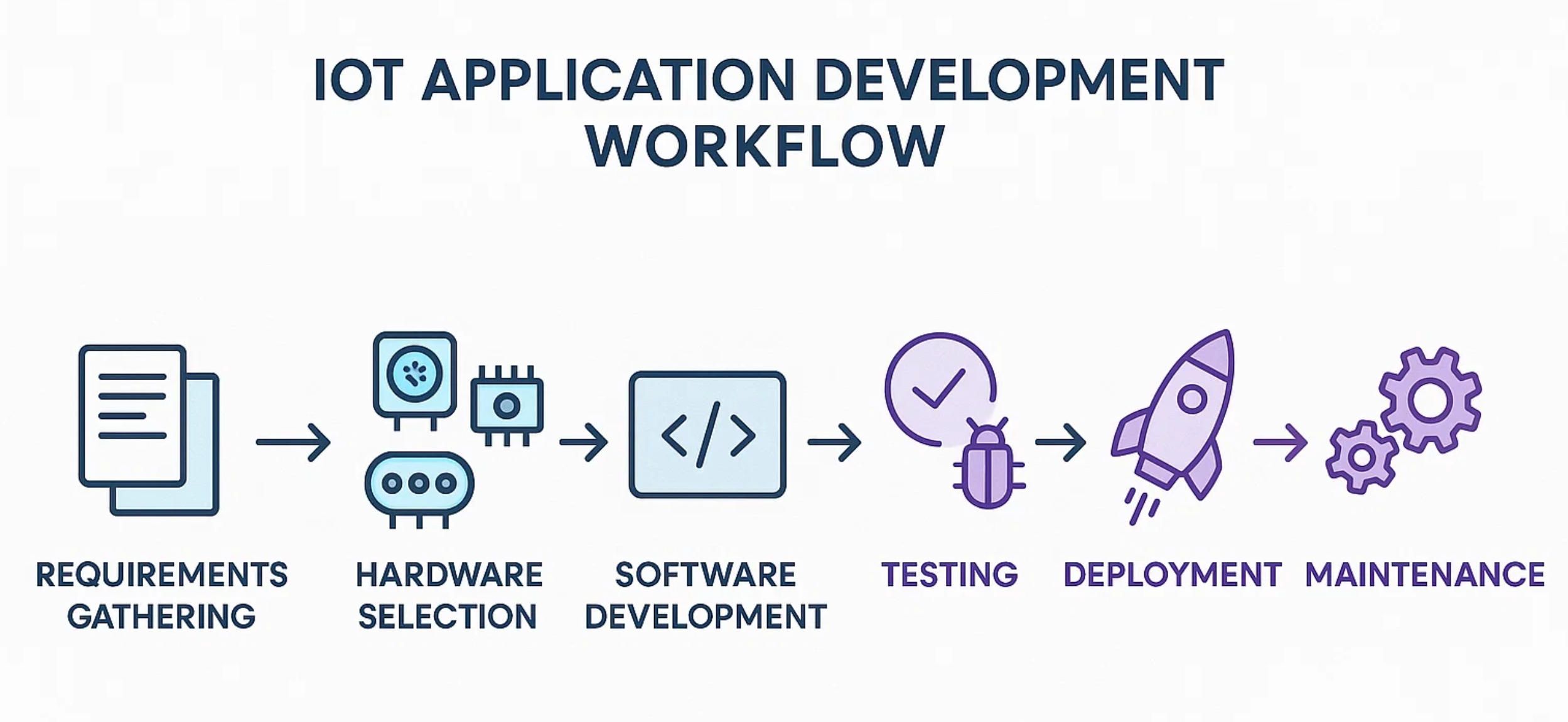
Development Process and Methodology
Successful custom iot app development service engagements follow structured methodologies that balance technical requirements with business objectives. The process typically begins with comprehensive requirements gathering, where development teams work closely with stakeholders to document functional specifications, performance metrics, and security protocols.
"Before you start developing your IoT app, you need to first define its requirements. Detailed and clear requirements are especially important when developing an IoT app. Since they need to be connected to a device, your requirements will be more complex compared to a standard app."
This quote from DECODE's comprehensive guide emphasizes the complexity inherent in IoT projects. Requirements documentation must address device connectivity protocols, data transmission frequencies, battery life considerations for portable devices, and fallback mechanisms for network interruptions.
Hardware selection follows requirements definition. Development teams evaluate available sensors, microcontrollers, and communication modules based on project specifications. Factors influencing hardware decisions include power consumption, processing capabilities, environmental durability, and cost at scale. Organizations may source components from established manufacturers or work with hardware design specialists to create custom configurations.
Software development encompasses multiple layers: firmware for device-level operations, middleware for data processing and routing, cloud infrastructure for storage and analytics, and user-facing applications for monitoring and control. Each layer requires specific expertise and must integrate seamlessly with adjacent components.
Testing and Quality Assurance
Quality assurance for custom iot app development service extends beyond traditional software testing. Hardware-software integration testing verifies that firmware correctly interprets sensor data and executes control commands. Environmental testing subjects devices to temperature extremes, humidity, and physical stress to ensure reliability under operational conditions.
Network reliability testing simulates various connectivity scenarios, including intermittent connections, bandwidth constraints, and complete network outages. IoT applications must handle these situations gracefully, implementing data buffering, automatic reconnection, and offline operation modes where appropriate.
Security testing identifies vulnerabilities across the entire system, from physical device access to cloud infrastructure. Penetration testing attempts to exploit potential weaknesses, while code reviews examine implementation details for common security flaws. Regular security audits maintain protection as new threats emerge.
Performance testing evaluates system behavior under realistic load conditions. As device deployments scale, data processing pipelines must maintain acceptable latency and throughput. Load testing identifies bottlenecks before they impact production operations, allowing teams to optimize architecture and resource allocation.
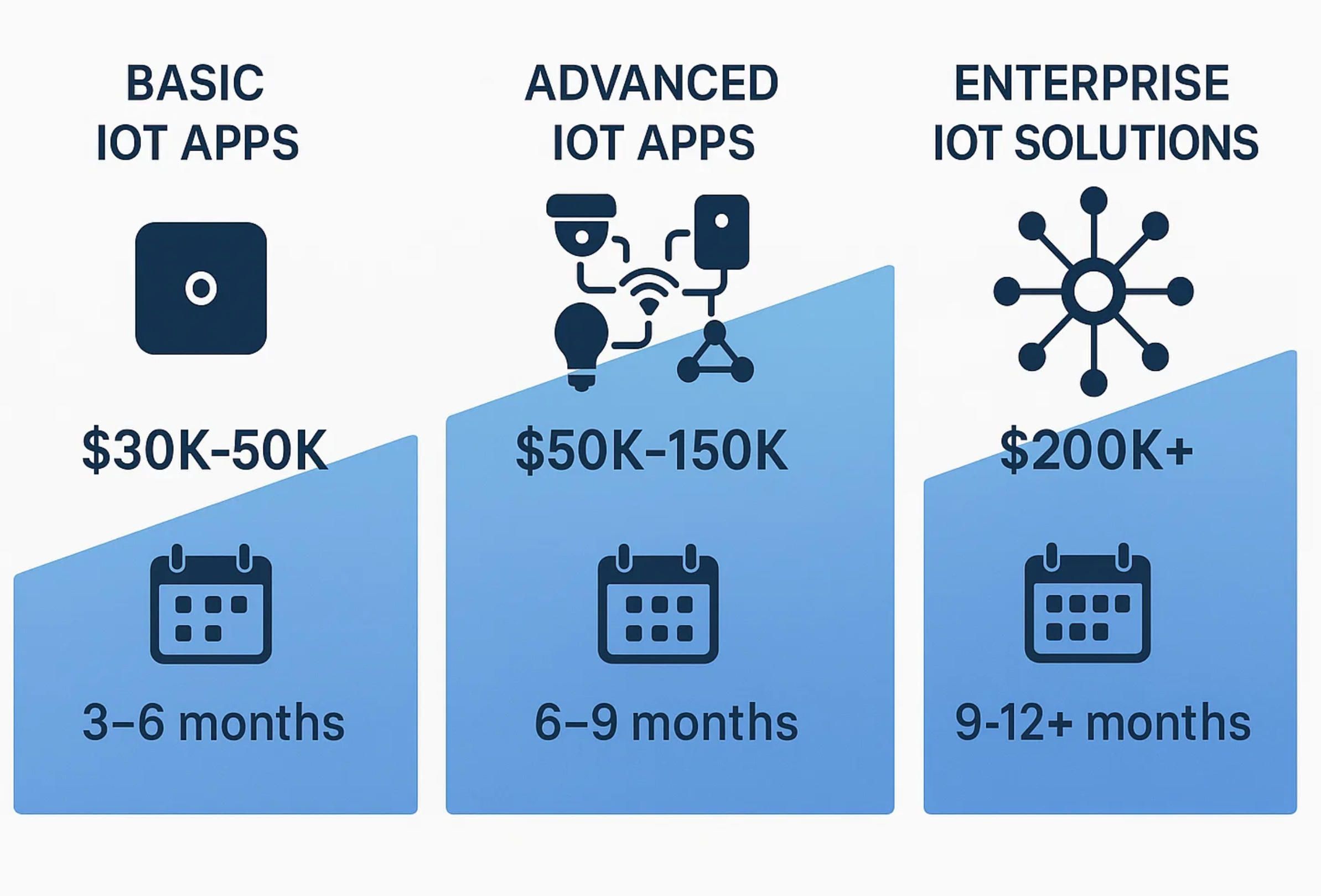
Cost Considerations and Project Timelines
Investment requirements for custom iot app development service vary significantly based on project scope and complexity. Basic applications managing single devices or simple tasks typically require investments between $30,000 and $50,000. These projects focus on fundamental connectivity and control features with straightforward user interfaces.
Advanced applications connecting multiple device types and implementing real-time analytics fall into the $50,000 to $150,000 range. These solutions incorporate more sophisticated data processing, geolocation services, and integration with external systems. Development timelines extend to accommodate additional testing and refinement cycles.
Enterprise-level implementations with extensive device networks, artificial intelligence integration, and complex security requirements often exceed $200,000. These projects demand specialized expertise across hardware design, embedded systems, cloud architecture, and data science. Development periods stretch to 9-12 months or longer, depending on organizational requirements and deployment scope.
Timeline estimation depends on several factors beyond pure development effort. Hardware procurement and prototyping add lead time, particularly for custom components. Regulatory compliance processes in healthcare and industrial sectors introduce additional review cycles. Organizations should budget time for user acceptance testing and iterative refinement based on real-world feedback.
Selecting a Development Partner
Choosing an appropriate custom iot app development service provider requires evaluation across multiple dimensions. Technical expertise represents the foundation—teams must demonstrate proficiency in relevant programming languages, cloud platforms, and IoT protocols. However, technical skills alone don't guarantee project success.
Industry experience matters significantly. Development teams familiar with specific sector requirements navigate regulatory compliance, industry standards, and domain-specific challenges more efficiently. Healthcare projects benefit from teams understanding HIPAA requirements and medical device regulations. Manufacturing implementations require knowledge of industrial protocols and operational technology security practices.
"When hiring an IoT development company, there are several key factors to consider: expertise in specific programming languages, technical skills in hardware design, firmware development, software development, and data analytics, as well as rigorous testing and quality assurance processes."
This assessment framework helps organizations evaluate potential partners systematically. Additional considerations include project management methodologies, communication practices, and post-deployment support capabilities. Agile development approaches facilitate iterative progress and accommodate evolving requirements, while DevSecOps practices integrate security throughout the development lifecycle.
Portfolio review reveals practical experience and problem-solving approaches. Organizations should examine case studies relevant to their industry and technical requirements. Client references provide insights into collaboration quality, deadline adherence, and issue resolution effectiveness.
Emerging Trends and Future Considerations
The custom iot app development service landscape continues evolving as new technologies mature and adoption patterns shift. Edge computing gains prominence as organizations seek to reduce latency and bandwidth consumption by processing data closer to devices. This architectural approach proves particularly valuable for applications requiring real-time responses or operating in bandwidth-constrained environments.
Artificial intelligence integration enhances IoT capabilities beyond simple data collection and monitoring. Machine learning models analyze historical patterns to predict equipment failures, optimize energy consumption, and automate decision-making processes. Training these models requires substantial datasets that connected devices generate naturally over time.
Low-power wide-area networks (LPWAN) expand connectivity options for battery-operated devices deployed across large geographic areas. Technologies like NB-IoT and LoRaWAN enable long-range communication with minimal power consumption, supporting applications in agriculture, environmental monitoring, and asset tracking.
Security requirements intensify as connected device populations grow and cybersecurity threats evolve. Regulatory frameworks like the US IoT Cybersecurity Improvement Act and EU Cyber Resilience Act establish accountability standards for device manufacturers and software developers. Compliance with these regulations becomes a competitive differentiator and customer requirement.
Partnering with A-Bots for IoT Development
A-Bots brings extensive software development expertise to custom iot app development service engagements. With experience across more than 70 projects and client relationships extending beyond five years, the company demonstrates sustained capability to deliver complex technical solutions. This track record reflects a commitment to quality and client satisfaction that extends throughout project lifecycles.
The team's mobile application development background translates effectively to IoT implementations, where user-facing applications serve as control interfaces for connected devices. A-Bots' experience with Android and iOS platforms enables development of companion apps that work seamlessly across device ecosystems. Cross-platform development approaches reduce time-to-market while maintaining consistent user experiences.
Testing capabilities prove particularly valuable in IoT contexts, where hardware-software integration creates additional complexity. A-Bots' quality assurance processes can validate functionality across device types, network conditions, and usage scenarios. This thorough approach identifies issues before deployment, reducing costly post-launch corrections.
For organizations with existing IoT implementations, A-Bots offers evaluation and optimization services. Testing established systems identifies performance bottlenecks, security vulnerabilities, and user experience improvements. These assessments provide actionable recommendations for enhancing current deployments or planning future enhancements.
Conclusion
The connected device ecosystem presents substantial opportunities for organizations across industries. A well-executed custom iot app development service creates tailored solutions that address specific business requirements while integrating with existing infrastructure. Success requires careful planning, appropriate technology selection, rigorous testing, and ongoing optimization.
Market growth projections indicate continued expansion of IoT adoption, driven by proven business benefits and improving technology capabilities. Organizations entering this space benefit from partnering with experienced development teams who understand both technical implementation details and industry-specific requirements. The investment in custom solutions delivers measurable returns through operational efficiency, enhanced customer experiences, and data-driven decision-making capabilities.
Whether building new IoT applications from concept or improving existing implementations, selecting the right development partner determines project outcomes. Technical expertise, industry knowledge, and proven delivery capabilities combine to create solutions that meet immediate needs while supporting future growth. As connected technology becomes increasingly central to business operations, strategic investments in custom iot app development service position organizations for sustained competitive advantage.
✅ Hashtags
#IoTDevelopment
#CustomIoTApps
#IoTSolutions
#ConnectedDevices
#IoTAppDevelopment
#SmartDevices
#IndustrialIoT
#IoTIntegration
#EdgeComputing
#IoTSecurity
#MobileIoT
#EnterpriseIoT
#IoTTesting
#IoTInnovation
Other articles
Custom CRM for Real Estate Developers Off-the-shelf CRM tools weren’t built for the complexity of real estate development — but we were. This in-depth article explores why custom CRM solutions are redefining how developers manage projects, leads, teams, and revenue. See real-world ROI calculations, key challenges, and expert insights from A-Bots.com, a top CRM development company.
Augmented-Reality Maintenance Apps for Cobots Industrial cobots are the future of automation, but servicing them efficiently remains a challenge. This article explores how Augmented-Reality maintenance apps, powered by IoT and AI integration, dramatically reduce downtime, costs, and errors. Discover real-world case studies, data-driven insights, and why partnering with A-Bots.com can future-proof your maintenance operations with cutting-edge AR solutions.
Food Delivery and Food Ordering Mobile App Development | A-Bots.com Food delivery and food ordering mobile app development has become essential for both startups and established enterprises. Customers now expect instant ordering, AI-based personalization, multiple payment options, and real-time courier tracking. A-Bots.com is a custom app development company that builds scalable and future-ready solutions for food delivery and food ordering startups worldwide. Whether you need full-cycle development, outsourced QA testing, or just a specific app module, our team delivers reliable, bespoke mobile solutions. We integrate the latest technologies including AI recommendations, drone delivery management, and AR menus to ensure your app stands out in a competitive market. Partner with A-Bots.com to create or test a food delivery app that exceeds user expectations and drives long-term business growth.
Coffee Shop App Development Company Comprehensive guide to coffee shop app development featuring detailed case studies of Scooter Coffee app and Biggby Coffee app implementations. Learn essential features including mobile ordering, payment integration, and loyalty programs that increase customer spending by 67%. Explore coffee shop finder technology and revolutionary cryptocurrency rewards concepts. Expert analysis of technical architecture, security, and testing protocols. Partner with A-Bots.com for custom development, blockchain integration, or QA services. The coffee apps market projected to reach $390M by 2033 with 14.9% annual growth.
Offline AI Chatbot Guide: Local LLM Setup and Custom Development This comprehensive guide explores offline AI chatbot solutions that prioritize data privacy and work without internet connectivity. Learn about top applications including GPT4All and Jan, understand the fundamentals of local language models from 3B to 70B parameters, and explore quantization techniques that make AI accessible on consumer hardware. The article provides detailed installation instructions for beginners requiring zero coding knowledge, explains model selection criteria, and examines use cases from personal productivity to enterprise deployment. Discover when off-the-shelf solutions suffice and when organizations need custom offline AI chatbot development for mobile platforms, enterprise integration, specialized fine-tuning, and compliance requirements. Includes professional development guidance from A-Bots.com for advanced implementations.
Top stories
Copyright © Alpha Systems LTD All rights reserved.
Made with ❤️ by A-BOTS
